Each year, the Center for the Advancement of Teaching celebrates the recipients of the Distinguished Teaching Awards at the Andrea L. Rich Night to Honor Teaching ceremony held at the Chancellor’s Residence. Unfortunately, due to the COVID-19 pandemic, the ceremony that would have taken place in 2020 was cancelled and the 2020 cohort of awardees was never honored with a Night to Honor Teaching event. This article shines a light on these deserving awardees.
The Distinguished Teaching Awards are UCLA’s highest teaching honor, recognizing individuals who bring respect and admiration to teaching at UCLA. The recipients are selected by the Academic Senate Committee on Teaching and separated into three award categories – six senate faculty members, three non-senate faculty members, and five teaching assistants.
To honor the achievements of the Teaching Assistant recipients of the Distinguished Teaching Awards, we are highlighting the exemplary qualities that make these educators serve as role models for their colleagues and the dynamic, innovative approach to their work that inspires our students to a lifetime of learning and achievement.
Clare Beer, Geography
At the heart of Clare Beer’s dedication and success is a very well thought-out, articulated, and implemented teaching philosophy. Her philosophy is rooted in an appreciation of critical analysis and social theory, and how these enhance students’ understanding of the collective human experience. She translates this philosophy into two pedagogical objectives: to help students strengthen their critical analytical faculties through written assignments and in-class exercises, and to inspire in them a willingness to question dominant power structures and their reinforcing habits of thought.
Clare states that teaching continues to be the biggest and most satisfying privilege of her job. It has the power to accomplish what few other career pursuits can: compelling young people to think about the world and themselves differently.
Nina Bjekovic, Italian
Nina Bjekovic’s principal aim is not just to promote interdisciplinary learning, but also to teach students to adopt interdisciplinary and transcultural ways of thinking in and beyond the classroom. Her teaching methodology keeps constantly abreast of changes in student demographics. She incorporates diverse techniques and resources to cater to different types of learners and ensures an invigorating environment by integrating new trends into her curriculum. She facilitates civic learning and democratic engagement, teaching students how to be conscientious digital citizens.
Nina writes, “The invigorating environment of UCLA consistently rewards me with diverse perspectives, invaluable resources, and mentors who encourage me to use my individuality to inspire and innovate. By continuing to reinvent my pedagogical identity, I hope to inspire students to exist as powerful and evolving sources of knowledge, potential, and change.”
Elizabeth Crawford, English
In her teaching statement, Elizabeth Crawford describes her teaching as a recursive process of constant reflection on subject matter, modes of understanding, and personal responsibility. Elizabeth’s students make progress by looking back, and they consolidate their ideas by providing feedback to others, deriving mutual benefit. Elizabeth’s students become more self-sufficient learners, but they also become more empathetic. Her students experience a process of intellectual, academic, and ethical maturation; they learn how to become responsible to each other for their growth.
Because of her deep concern for student wellbeing, her careful planning of their learning experiences, and her innovative and authentic activities and assignments, Elizabeth’s students flourish across disciplines and throughout their lives.
John Kardosh, Philosophy
John Kardosh’s philosophical mastery, his keen interest in pedagogy, and his personal devotion to student achievement, all combine to yield a truly special, truly distinguished, classroom experience. He assesses and meets the needs of students of varied level and ability and will do whatever it takes to help each student succeed in the class and beyond.
John writes, “I am most fulfilled as a teacher when my students and I can freely and seriously think together. Their contributions move the inquiry I love forward. Collaboration in conversation has formed some of my strongest connections to students.” John is approachable and puts students at ease, which allows them to feel that they are essential contributors to a shared intellectual enterprise.
Laura Muñoz, Spanish & Portuguese
Laura Muñoz seeks to create a safe environment where all students, regardless of their backgrounds or areas of interest, feel equally empowered to participate and to learn. Her teaching philosophy is based on challenging students to identify and bring forward missing voices and perspectives. Making connections to current global events, cultural trends, and tracing the consequences of important historical moments in the present serves to foster empathy in students. She shows students a path, not just through a class, but one that leads to their futures as successful community leaders and global citizens.
Laura frequently checks in with students over the way course material is presented, what resources they might need, and acknowledges the different learning styles students benefit most from. She states, “It is crucial to create a safe space for students to participate actively and openly in discussion or language activities.”
View all the 2020 DTA recipients’ interview clips on the 2020 Night to Honor Teaching page.




